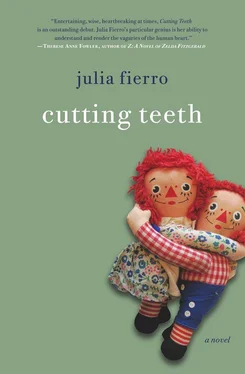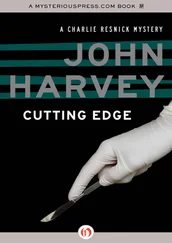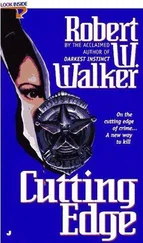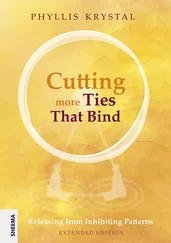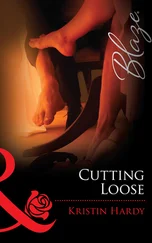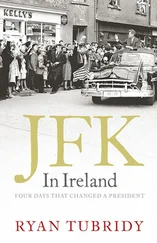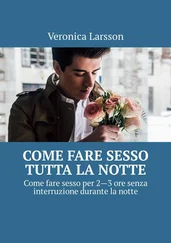Chase raced past with a grawr!
“My Chase needs me,” said Tenzin, and went to him.
“Well,” Tiffany said, “shoot me a text, Leigh-Leigh. If you want to hang tomorrow? ’Kay?”
Leigh looked into Tiffany’s mascara-smudged eyes.
“Okay,” she said.
Tiffany pulled her into a furtive hug. “Love you,” she said into Leigh’s ear, then twirled away from her, to the front door, where her Orla Kiely weekender bag (a gift from Leigh) lay next to Harper’s princess backpack. “Harp! Michael!” she called up the stairs. “Time to go!”
After the three of them were gone, Leigh sat on the pilled couch, nursing Charlotte, thinking of how today was the last playdate Harper and Tiffany would have with her and Chase. Harper and Tiffany would never join their Friday afternoon playgroup again. Rip and Hank might playdate with them still, because Rip liked Tiffany’s boobs and drinking wine with her. But Leigh was certain the mommies were through with Tiffany after last night. Sure, they were all playing nice this morning, but Tiffany’s e-mail address would not be included the next time a playgroup invite made the rounds.
Leigh caught her reflection in the tacky mirror on the wall opposite the sofa, cut into the shape of dolphins midair. There she saw Leigh the mother, the nurturer, her arms filled with new life, and she knew her choice had been worth all the terrible things lying in wait.
She stroked the inside of her Charlotte’s arm, then her earlobe, the softest thing Leigh would ever feel, and the baby’s eyes fluttered, her suck slowing to a perfect rhythm, three light sucks, then a stronger suck, three light, one strong, three light, one strong …
odd man (woman) out: Tiffany
As they drove farther west, the lush greenery was replaced by dull, brick apartment complexes and gas stations, and Tiffany had a rare pang of nostalgia for her hometown. The sea breeze and firefly-lit shore. The sound of boat horns in the night.
She knew she would find another set of mommies. There were plenty of neighborhoods in the city where the sophisticated, educated, and wealthy families clustered, sucking dry the culture of the people they replaced. If there was one thing Suzie Harcourt had taught her, it was that women were the same, no matter what class they were born into. The rich ones were just more skilled at hiding their flaws.
She had simply used up this particular Brooklyn neighborhood. Maybe they’d move over to Park Slope. Those mommies, in a neighborhood just a few subway stops away, were famous for their elevated domestic awareness. Maybe they were just the kind of motherhood companions she needed. She would find a group of women who took family life seriously. Who ate organic, who canned their own fruit and vegetables, who knit, and made their own soap and cleaning supplies from all-natural products. Mommies who weren’t afraid to breast-feed their preschoolers in public but wore the distinction with pride. Mommies who, like her, were doing it all. They were mothers, creators, community organizers, domestic dynamites, and entrepreneurs.
Park Slope would be a trek for Rip. Maybe, if she moved, he and Hank would fade naturally from her life. She could still recall the taste of his tongue in her mouth the night before, and it made her nauseous.
Other memories of last night repulsed her, too: Leigh’s hot breath on her neck, whispering, Your precious little Harper will never set foot in St. Ann’s.
It didn’t matter, thought Tiffany as she listened to Harper snuffle sleepily in the backseat. She would find her Harper Rose a different school to attend. A better one. There was no way in hell she was going to bend to Leigh’s will and grovel for a second chance.
Tiffany had learned at an early age, around fifth grade, when the girls began to play nasty — a clique welcoming a girl, then exiling her in one day — that it was simple. Girls just want to be loved. She knew that on the übercompetitive playgrounds of yuppie Brooklyn, one can always use another mommy friend. And she had her mommy pick up lines perfected. Most of Brooklyn’s brownstone neighborhoods were teeming with stay-at-home mommies who had put ambitious personal and professional lives on hold, to live what they (not she) came to see, with startling surprise, was a tedious life with little children. Chances were that a hint of weakness ( ugh, what a day, Tiffany might say) exposed to the right person (preferably depressed) at the right moment (late in the day when they had the playground to themselves) could make even the most reserved mommy (Leigh) open up. The other mommy sighing and turning to Tiffany with a grateful smile to say, me too. A friendship born.
They were visual artists, CEOs, playwrights, chefs, opera singers, and attorneys. They had worked at the UN, the Stock Exchange, Columbia University, and Lincoln Center. They were power-hungry women (and a few men) who had sacrificed hard-won careers. Women who had birthed their children one right after another. They’d had to because they had waited so long to do the baby-dance, and before they knew it, they were making six-figure salaries, nearing forty years old and childless. Tiffany saw how this made mommying harder, having to take care of two or three kids under the age of four. Wham bam, thank you, ma’am child-rearing, she called it, relieved, and even a bit gloating about the fact that, at thirty, she was considered a young mother. She saw the glint of envy in many a mother’s squint when they heard how young she was, when they realized that Tiffany could take motherhood nice and slow.
As they drove up the steep ramp that skirted the ancient and crowded Calvary Cemetery, and the Manhattan skyline loomed so suddenly, Tiffany felt anything was possible. She had time. Time to repair before she became a mother to another child. As they took the exit for Brooklyn, the city of never-ending promise vanishing in the rearview, she started to plan. She would inject her family’s home with positivity. She wasn’t clueless — she knew who she was. To be honest, she didn’t believe that people could really change, but there was always trying.
Those women whose girlhoods had been good — or at least good enough that they hadn’t run from them, she thought — they couldn’t see how easy it was to remake yourself. All you needed was a bus ticket, a few hundred bucks, and someone, preferably, the right someone — Suzie Harcourt, Michael, Leigh — to need you. She knew she was better than the other mommies in at least one way. Their worst fear was that they were bad mommies. Not her. No way in hell. That was one thing she didn’t have to question. She was a damn good mommy.
“Snacks?” Grace asked.
“Check,” Rip said.
“Sippy cup?”
“Check.”
She went on and on, until Rip thought he would hurl the two suitcases out the window, stuffed with Grace’s outfits, and Hank’s — matching white seersucker pants and jacket, clothes that Hank hadn’t even worn. No wonder the kid had wanted a dress. Grace dressed Hank like he was her little doll, playing pretend when it suited her and, when bored, disappearing behind her bedroom door, the click of the lock a signal she’d had enough.
He tried to remember the feeling he’d had the night before, when he had knelt by Hank’s cot and draped the pink princess dress over his sleeping son. A blanket fit for fairy-tale dreams, Rip had thought before kissing Hank’s forehead.
Now, as he stood in front of the window, watching the seagulls drop claw-flailing crabs to their doom on the sea rocks, he couldn’t summon that feeling. That unconditional love. Wasn’t that what they called it in the parenting books, in therapy, and on TV talk shows? The all-consuming love that only a parent can have for their child? Wasn’t that what he’d felt last night as he sped around the moonlit curves of the road, the mosquitoes splattering against his windshield, as he burst through the doors of Target and into the blinding fluorescent light, as he raced down the aisles, ripped the princess dress from the rack, and threw it on the whirring checkout conveyor belt?
Читать дальше
